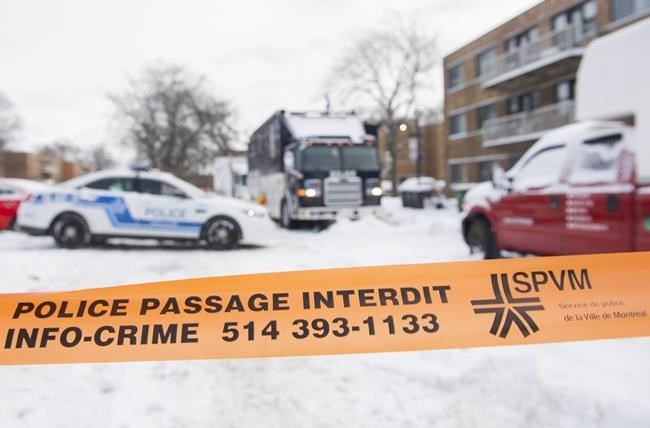
Police tape is shown at the scene outside an apartment building where two people were found dead in Montreal on Dec. 27, 2022. THE CANADIAN PRESS/Graham Hughes
Republished June 12, 2024 - 2:08 PM
Original Publication Date June 12, 2024 - 9:31 AM
MONTREAL - Quebec must further tighten the net of services that protects victims of domestic violence, a coroner said Wednesday as she released her report into a murder case involving a man who strangled his wife and two sons in 2019 before dying by suicide.
Coroner Andrée Kronström stressed in particular the need to educate people on coercive control and domestic violence and to make sure they know about all the resources available. However, she said it was unclear whether even improved services could have prevented the deaths of Dahia Khellaf and her two young sons Adam and Aksil, ages four and two.
"Despite everything, all the tools, all the grids of analysis, there are people who fall through the gaps in the net," she told a news conference Wednesday. "But we are trying to tighten the stitches as much as possible."
Kronström's report examined the killings of Khellaf, 42, and her sons, as well as the Dec. 10, 2019 suicide of Khellaf's estranged husband, Nabil Yssaad, who strangled his family in their Montreal home before driving to a hospital and jumping to his death from a sixth-floor window.
The report, which follows an inquest last fall that heard from dozens of witnesses, says the relationship between Khellaf and Yssaad was marked by an escalating pattern of domestic violence since the two were joined in an arranged marriage in 2012.
The coroner found Yssaad began insulting and humiliating his wife soon after he arrived in Canada from Algeria in 2014. The abuse escalated into a physical assault in early 2018 in which Yssaad pinned his wife to the ground and threatened to kill her. Khellaf would later file a police report in August of that year, outlining two separate allegations of assault and threats, including an alleged threat by her husband to stab her in the eye with scissors.
Kronström said that Khellaf was "proactive" in trying to address the violence by seeking counselling through a workplace program, going to police and seeking legal aid.
However, neither she nor her husband turned to the numerous community organizations that could have helped — suggesting that they hadn't been aware of all the resources available. Khellaf, the coroner added, didn't appear to realize she was being abused until her husband turned violent.
"As long as it didn't come to physical violence, she didn't see it, and there were neighbours who testified to the same effect," she said. "For them there was nothing happening because there was no physical violence, she had no marks on her body."
Five days before the killings, Quebec prosecutors dropped four charges against Yssaad — including assaulting and threatening Khellaf — after he agreed to sign a peace bond. The bond barred Yssaad from contacting Khellaf or being within 100 metres of her house.
The couple had separated at the time of the killing and Khellaf was in the process of divorcing her husband.
When Khellaf filed the police complaint in August 2018, she told prosecutors her main goal was for her husband to get psychological help, and she refused to testify against him. Yssaad underwent an evaluation that found “no active mental illness," and he was released on the condition he not contact his wife.
The coroner concluded Yssaad's risk of violence had likely not been properly evaluated. She noted the focus was placed on checking for mental illness, which overlooked a personality disorder and propensity to exert control.
In her report, the coroner cited testimony by psychologist Suzanne Leveillée, who found that Yssaad showed signs of a narcissistic personality, which is one of the warning signs for family homicides. Leveillée found that killing his estranged wife and children was his way of exerting “ultimate control" over his family.
“By placing his family in the same bed after the murders, he wanted to say that they would be together forever and it was his ultimate decision and (him) taking control,” the coroner wrote.
The coroner said that despite the many improvements in available services since 2019, more support, co-ordination and education is needed, especially regarding family murder-suicides. Her recommendations to the province include moving forward with an assessment process for violent spouses and increasing education for new immigrants and young people about domestic violence and coercive control.
In her report she noted that it can be hard for victims such as Khellaf to sever ties with aggressors, especially when children are involved. She suggested perpetrators need more resources, including shelter spaces, to help stop them from reoffending.
The province's chief coroner ordered a public inquiry after a 2022 coroner's report into the deaths raised concerns about prosecutors and the judicial system, saying more could have been done to protect Khellaf and her children.
Kronström, however, declined to lay blame. She said the signals pointing to a murder-suicide can be missed, in part because victims are often ashamed to speak out about the abuse they’re experiencing.
"When it comes to domestic violence ... we're getting into the intimacy of a couple, so it can be very hard to see the signs," she said.
This report by The Canadian Press was first published June 12, 2024.
News from © The Canadian Press, 2024